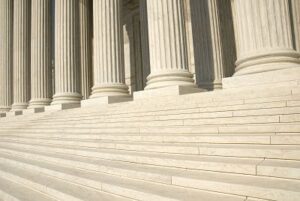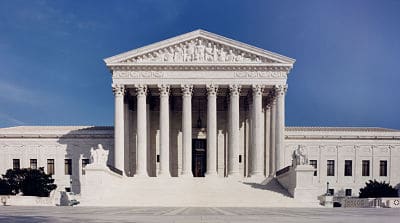 A former Illinois government worker whose lawsuit ended mandatory fair-share fees for public-sector unions has filed a petition with the United States Supreme Court seeking reimbursement.
A former Illinois government worker whose lawsuit ended mandatory fair-share fees for public-sector unions has filed a petition with the United States Supreme Court seeking reimbursement.
Fair-Share Fees and Janus v. AFSCME
The plaintiff, Mark Janus, previously worked as a child support specialist at the Illinois Department of Healthcare and Family Services under a contract negotiated between the public-sector union AFSCME (American Federation of State, County and Municipal Employees) and the State of Illinois.
Though Janus had not been a member of the union, AFSCME still advocated on his behalf because public-sector unions in Illinois are required by law to represent everyone in a bargaining unit equally. The contract also demanded that each worker in the unit pay fair-share fees, the costs associated with collective bargaining. Fair-share fees, which are not the same as union membership dues, were first approved under the National Labor Relations Act of 1935. The Supreme Court affirmed the legality of fair-share fees in 1977 with Abood v. Detroit Board of Education.
In 2015, Illinois Gov. Bruce Rauner issued an executive order giving state workers permission not to pay fair-share fees and ordering state agencies to stop collecting them on behalf of public-sector unions. Rauner also filed suit to end fair-share fees, arguing they were unconstitutional.
Rauner was dropped from the lawsuit after a federal judge ruled he did not have the legal standing to bring it, but Mark Janus later joined it as an injured party. Janus asserted that he should not have to pay fair-share fees – which amounted to approximately $45.00 per month from his paycheck – when he was not a member of AFSCME.
In Janus v. American Federation State, County, and Municipal Employees, Council 31 (also known as Janus v. AFSCME), his attorneys argued that the First Amendment prohibited mandatory fair-share fees because collective bargaining for government workers is inherently political. Since the public-sector union negotiations impact the use of taxpayer funds and state budgets, the lawsuit alleged that requiring workers to pay fair-share fees would amount to compelled speech, violating the First Amendment.
Union advocates argued that ending fair-share fees could hurt organized labor by undercutting membership and funding, with the executive director of AFSCME Council 31 calling the case a “blatant political attack by Bruce Rauner and other wealthy interests on the freedom of working people to form strong unions.”
On June 27, 2018, the Supreme Court issued a 5–4 decision in favor of the plaintiff, overturning the precedent established in Abood. The ruling impacted public-sector workers in 22 states and the District of Columbia, including more than 75,000 public employees in Illinois.
In a dissenting opinion, Justice Elena Kagan argued that the Court’s decision could disable the representation of government workers and overturn legal frameworks across the country.
“There is no sugarcoating today’s opinion. The majority overthrows a decision entrenched in this Nation’s law— and in its economic life—for over 40 years,” wrote Justice Kagan. “As a result, it prevents the American people, acting through their state and local officials, from making important choices about workplace governance. And it does so by weaponizing the First Amendment, in a way that unleashes judges, now and in the future, to intervene in economic and regulatory policy.”
Petition Seeks to Overturn Lower Court Rulings
Shortly after the Supreme Court’s decision, Mark Janus filed a federal lawsuit seeking damages from AFSCME in the total amount of his paid fair-share fees.
In March 2019, a U.S. District Court granted summary judgment in favor of AFSCME, a decision affirmed by a panel of the 7th Circuit Court of Appeals in November. That panel found that the union could raise a good-faith defense to liability for the fair-share fees collected before Janus v. AFSCME.
“Until [Janus] said otherwise, AFSCME had a legal right to receive and spend fair-share fees collected from nonmembers as long as it complied with state law and the Abood line of cases,” the panel wrote. “It did not demonstrate bad faith when it followed these rules.”
In response, Janus filed a petition with the Supreme Court on March 9, 2020, asking that it follow up on its decision in his earlier lawsuit. He is represented by attorneys from the Liberty Justice Center and National Right to Work Legal Defense Foundation, conservative legal groups.
The petition asserts that Janus and other public-sector workers like him are entitled to receive back pay for their fair-share fees, arguing that defendants should not be able to shield themselves from liability over damages for violating constitutional rights “if the defendant acted under color of a law before it was held unconstitutional.”
AFSCME general counsel Judith Rivlin issued a public response to the petition.
“Federal courts across the country continue to reject these attempts by corporate interests to manipulate the judiciary against working people and trample on their rights and freedom to join together in a union,” Rivlin said. “Working people have won every single case thrown at them by these special interest groups, and if judges continue to weigh these cases on the facts and merits, the corporate interests behind them will continue to fail in their efforts to further rig the system in their favor.”
Representing Chicago’s Injured Workers for Over 40 Years
It remains uncertain whether the Supreme Court will agree to hear Janus’ latest case. Regardless of the Court’s decision, it should be clear that corporate interests are continuing their assault on the legal protections that American workers have won over the past century thanks to the tireless efforts of organized labor.
At GWC Injury Lawyers LLC, we have stood proudly with unions since our inception. For more than 40 years, GWC’s dedicated workers’ compensation attorneys have represented members of virtually every organized labor union in Illinois.
These unions frequently refer their members to our firm because they have seen firsthand how GWC gets results, with over $2 billion recovered in verdicts and settlements on behalf of injured clients. Our Chicago workers’ compensation lawyers have the experience, the determination, and the reputation of success you need to help get you and your family the justice you deserve.
If you have been injured in the workplace, contact GWC today to schedule a free, no-obligation consultation with a Chicago workers’ compensation attorney. You may call our office at (312) 464-1234 or click here to chat with a representative at any time.
<< BACK TO BLOG POSTS